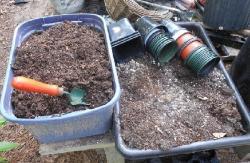davidsevit said: rick i like your way of thinking.as i know ignorance comes from ignore.that is worse than just lack of knowledge.
I call that "willful ignorance" and I frown at it.
"Lack of knowledge" probably just means someone never had good teachers or learned to teach themselves. That's probably not their fault. "Stupidity" properly so-called is just a limitation someone was born with - not their fault.
But CHOOSING not to learn from experience or good teachers IS a choice and not one that I admire.
{Edited to add:
There are many people with an "Engineering" approach to gardening and I can't fault that. They want to know HOW to make things grow, but are not particularly interested in underlying reasons or scientific theories. They'd rather BE gardening than reading ABOUT gardening.
How can anyone fault that?
}
davidsevit said: by the way the compost is starting to get that lovely smell i identify from travelling to the high tatras in slovakia in the forest.
I love that smell! It smells like ... healthy soil!
I thought it might go fast once the air reaches most of the pile. If you want to speed it up more, stir it somewhat whenever you peek inside. If it seems too soggy for air to circulate well, leave the lid slightly open for a few days so excess water can escape as humidity. If it seems dry in the center, sprinkle a little water.
The fermenting anaerobic microbes "pre-digested" your raw materials and turned some of them to slime. I expect that slime to break down almost exactly as fast as plenty of air gets to it.
davidsevit said: when the "powder" is ready ....how deep does it have to go into an existing plantpot to be beneficial?
Well, I would be nervous about digging down into a pot that has already been filled with plant roots! Won't you kill a lot of roots if you scratch any deeper than a few cm?
In a raised bed, I like to scratch the compost into the top few inches of soil so it is well mixed with soil microbes and also with the moisture that soil holds. However, many people just "top-dress" with compost outdoors, trusting rain and worms to drag the compost down into the soil, or dissolve it and leach it down into the soil.
Pots don't have worms, and usually have MUCH less soil life than outdoor soil. Usually people who grow plants in pots figure that they CAN'T support a healthy soil ecosystem in each little pot, so they rely on well-draining soilless mixes and chemical fertilizer, or things like fish emulsion that are partly broken down already.
Please give the other side of the story, someone who DOES try to keep organic soil going in small pots!
If I were you, and added compost to POTS, I would either just top-dress with it or scratch it VERY gently into the top of the soil, but AVOID breaking any roots I could. Or re-pot the whole pot, mixing in some compost, but also mixing in something coarse so that the compost doesn't make the potting soil too "dense" to allow air in.
Just as lack of air kills the beneficial aerobic microbes in a compost heap, lack of aeration in a POT kills the root hairs even faster.
davidsevit said: is it a long process until the plant recogniges it has been fed with nutrition?
will i see a diferance if i feed one identical plant and not feed the other?
How long before a plant perks up? IF (... "IF", I say ...) ... IF you've identified the ONLY problem that plant has, I would expect some improvement in a few days to a week, or two weeks at most. If it's a lack of mobile nutrients, the bottom leaves should become greener and less yellow. If it's a lack of IMmobile nutrients, the newest top leaves should start coming in a little greener in a few days.
However, if you're feeding that plant any chemical fertilizer, how likely is it that a problem is purely lack of soluble nutrients? Compost has many benefits other than simple feeding, and they tend to affect the soil, and only after that, indirectly, the roots and the plant.
Also, often a seeming lack of some nutrient doesn't mean the soil is LACKING that nutrient - it might be there in an UNAVAILABLE form - like insoluble due to pH, or damaged roots can't take it up fast enough. Test for that by spraying something on the leaves - foliar feeding. Iron works well that way: it might be insoluble in the soil or impeded by excess of some other mineral.
So a better answer is "I don't know". A rapid improvement can be hoped for, but gradual improvement is more likely. And, if there are other "pot problems", a few weeks could go by before you know you need to keep hunting for another solution.
Hey, I don't grow very many thing in pots, and when I do, the mix is SO well-draining and aerated that I have to water daily. I'm not the best one to ask about growing in pots! I hope others chime in.
trial and error. Many many errors, and dead plants to show for it. Since our trials and errors vary from Alaska to Hawaii and Florida, well something that works for one doesn't always work for all.
Applause! Applause!

